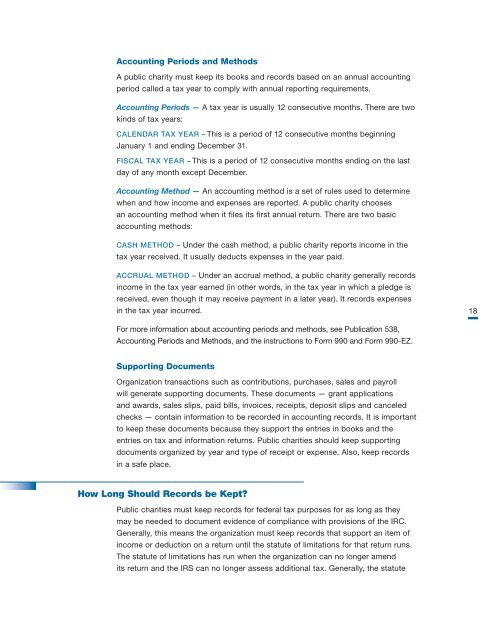The Nonprofit Incubator
The Nonprofit Incubator
The Nonprofit Incubator
Create successful ePaper yourself
Turn your PDF publications into a flip-book with our unique Google optimized e-Paper software.
Accounting Periods and Methods<br />
A public charity must keep its books and records based on an annual accounting<br />
period called a tax year to comply with annual reporting requirements.<br />
Accounting Periods — A tax year is usually 12 consecutive months. <strong>The</strong>re are two<br />
kinds of tax years:<br />
CALENDAR TAX YEAR – This is a period of 12 consecutive months beginning<br />
January 1 and ending December 31.<br />
FISCAL TAX YEAR – This is a period of 12 consecutive months ending on the last<br />
day of any month except December.<br />
Accounting Method — An accounting method is a set of rules used to determine<br />
when and how income and expenses are reported. A public charity chooses<br />
an accounting method when it files its first annual return. <strong>The</strong>re are two basic<br />
accounting methods:<br />
CASH METHOD – Under the cash method, a public charity reports income in the<br />
tax year received. It usually deducts expenses in the year paid.<br />
ACCRUAL METHOD – Under an accrual method, a public charity generally records<br />
income in the tax year earned (in other words, in the tax year in which a pledge is<br />
received, even though it may receive payment in a later year). It records expenses<br />
in the tax year incurred.<br />
18<br />
For more information about accounting periods and methods, see Publication 538,<br />
Accounting Periods and Methods, and the instructions to Form 990 and Form 990-EZ.<br />
Supporting Documents<br />
Organization transactions such as contributions, purchases, sales and payroll<br />
will generate supporting documents. <strong>The</strong>se documents — grant applications<br />
and awards, sales slips, paid bills, invoices, receipts, deposit slips and canceled<br />
checks — contain information to be recorded in accounting records. It is important<br />
to keep these documents because they support the entries in books and the<br />
entries on tax and information returns. Public charities should keep supporting<br />
documents organized by year and type of receipt or expense. Also, keep records<br />
in a safe place.<br />
How Long Should Records be Kept?<br />
Public charities must keep records for federal tax purposes for as long as they<br />
may be needed to document evidence of compliance with provisions of the IRC.<br />
Generally, this means the organization must keep records that support an item of<br />
income or deduction on a return until the statute of limitations for that return runs.<br />
<strong>The</strong> statute of limitations has run when the organization can no longer amend<br />
its return and the IRS can no longer assess additional tax. Generally, the statute

















